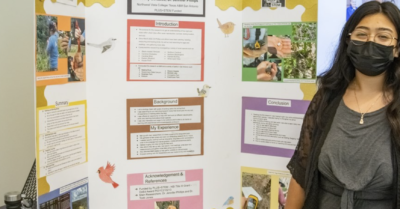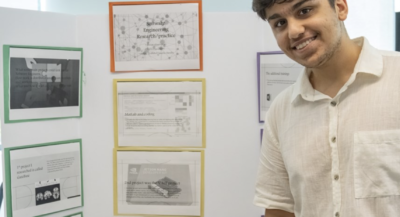The first student group in the grant-funded Northwest Vista College Plus+STEM Project were recognized for their internships at the first Plus+STEM Symposium on July 28. These students also completed summer workshops at NVC and are on their way to becoming future scientists by getting their feet wet this summer in statistics, chemistry and engineering.
The celebration included student speeches, certificate awards, and poster presentations that explained each students’ research and outcomes from their summer internships.
“This has been an amazing experience,” said NVC student Moamel Kassem, who interned at Terracon Consultants, Inc. Kassem became interested in STEM at NVC “after taking a science class by accident.”
Along with Terracon Consultants, Inc., other organizations participating in the internships included Texas A&M University–San Antonio, The University of Texas at San Antonio, The University of the Incarnate Word, Northwest Vista College, and Wanke Elementary.
The Northwest Vista College Plus+STEM Project (Portal Leading to Undergraduate Success in Science, Technology, Engineering & Math), was created by NVC faculty members Dr. Prakash Nair, project director/principal investigator, and co-principle investigators Dr. Claudia Verdin and Dr. Thomas Pressly.
In 2021, Plus+STEM was awarded $5 million, the largest grant to date at NVC, from the U.S. Education Department’s Hispanic Serving Institutions-Science, Technology, Engineering, or Mathematics and Articulation Programs (HSI-STEM). The HSI-STEM programs are aimed at increasing the number of Hispanic and low-income students earning degrees in STEM fields, as well as developing transfer agreements with two- and four-year colleges.
In addition to the workshops this summer, students will benefit from the Plus+STEM Project through tutoring, paid research internships, research internships with stipends of up to $4,200, advanced STEM equipment, mentoring, symposiums, mental health support and high school outreach.
Summer Workshops
In the engineering sessions on Rapid Prototyping, NVC Professors Mark Jurena and Pressly presented students with the theory of stress/strain in torsion and bending as well as the physics of projectile motion.
Students analyzed and measured the dimensions of an initial 3D printed catapult design and measured the range of a thrown crumpled page of paper. Students then used CAD (Computer Aided Design) software to make changes to the design based on the theory presented.
“The updated 3D models were 3D printed, with help from the NVC STEAM Makerspace. Then students used the STEAM Makerspace for cleaning and post processing of their designs and then remeasured the range,” said Pressly. “Most student groups were able to achieve a 20-100% improvement in the range of the throw.”
The chemistry sessions conducted by Dr. Simon van Dijk were designed to give students hands-on experience with important basic concepts in chemistry. Students performed experiments related to measurements and density, concentrations and dilutions, and synthesis of an organic compound. The importance of safety was discussed and enforced during each session.
“Students worked on a project where they made a boat out of foam board, mathematically calculated the number of pennies required to sink the boat in water, and then verified it by actually adding pennies to their boat to make it sink,” said Nair.
“Students really enjoyed the hands-on experience working with different glassware and some safe chemicals,” added Nair.
According to Verdin, the workshops challenged students and exposed them to a problem-solving course where NVC Professor Manuel Escobar engaged in critical thinking and problem-solving. Students navigated applied problems in algebra, geometry and trigonometry.
During the statistics workshops, conducted by NVC Professor Javier Guerra, students were introduced to the measures of center, measures of variation, essentials of probability, normal distribution, confidence intervals, and hypothesis testing to prepare for research, thesis or dissertation in the future.


